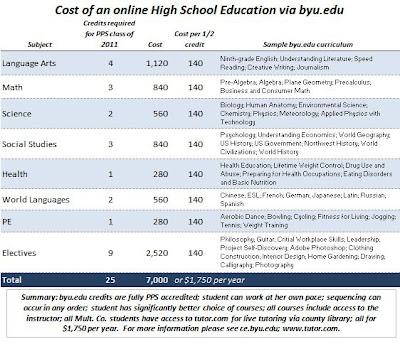
- The student can self pace
- The student can be self-directed
- All assessments are performed online with instant feedback to the student
- There is a remarkable diversity of courses one can take to fill credit requirements
- It can be done anytime, anywhere
- There is access to a course instructor for questions and feedback
- Every course is accredited and (at least in our school district) accepted for equivalent credit.
So, knock on wood, we'll have a joyous graduation celebration this spring.
However, this whole experience has got me thinking about online education. It definitely does have its benefits. And it is extremely cost effective. As a little exercise I calculated what it would cost to get a complete high school education on byu.edu. It turns out to be $7,000 (which includes $25 per half-semester course to pay a proctor fee for the final exam, or $625), or $1,750 per year.
The chart shows the breakdown of costs. In addition to the coursework, students here in Multnomah County can get free online tutoring through the local library system through an arrangement with tutor.com.
I'm not advocating that everyone just get their high school courses done online, I am interested in what the implications are for the public school system. This is a far cry, economically, from a $15,000 per year private school alternative. It essentially sets the bar for a quality, diverse, guided path through the required curriculum at $7,000. The question is, what value does the public school system deliver for the remainder of the money spent. In Portland, the cost of educating a student for one year is $9,714, or $38,856. By my calculation, the coursework associated with that investment has been valued at $7,000. How is the district delivering an additional $31,856 of value over the course of a student's high school career?
I'm definitely not trying to undermine public education. I'm just pointing out that alternatives exist at a price point that is attractive. And I'm wondering if this might spur those in charge of public education policy to innovate a bit more to meet the needs of the students and parents in their systems on the basis of this new economics.


4 comments:
I agree with your central point--if technology can't provide us with better alternatives for life, what's the point? Good to see universities willing to accept non-traditional credits.
But you have another issue on your hand with your son who won't do work assigned to him in a traditional setting. I would be sure you have THAT issue resolved before you shell out any money for him to not do the work in college--not everyone is ready for that at 18 and perhaps you should be open to a non-traditional path to a degree for your non-traditional learner.
I was an instructor for several years for BYU's Independent Study. I was surprised at the level of writing students completed. Their independent work was often at a higher level than writing produced by my traditional high school students at a public high school.
I'm a huge fan of online learning, especially for the non-traditional student or to extend learning beyond the curriculum offered in school. But let's not discount the value of the socialization that occurs in school, the exposure to a diversity of ideas and opinions that is less likely to occur online, and the value of extra-curricular programs and clubs that give students an opportunity to try different ways of being in the world, to pursue their non-academic passions, to learn to work collaboratively even if their teammates are annoying or less able. I don't know if all of that is worth over 30,000 dollars, but it's sure worth something!
kbonline,
I agree that the socialization aspect of public school (or any school setting) is of high value.
My reason for the original post was not to advocate that everyone ditch their school in favor of an online-homeschool solution. Rather I'm wondering if there might be an opportunity to restructure our public institutions so that the credits can be earned in a different format (online courses instead of 30:1 classroom settings), and have the bulk of the time and labor resource spent on managing project-based learning.
I'll write another post for the main blog on this, but in short, why not allow students to self-pace through the required curriculum, and then spend their time on meaningful projects under the management of trained teachers. In this way they'd get the socialization, but it would be in the context of collaboration on projects that put to use the learning they've done in their courses.
The coursework in this scenario would cost $1750 per year. How much high quality project design and management could we buy for the other $8000 per student per year?
Post a Comment